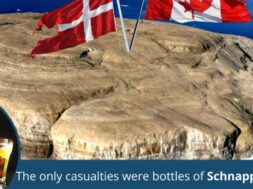
Roving Periscope: 50-year-long “Whisky War” ends between Canada, Denmark
Virendra Pandit
New Delhi: The five-decade-old “Whisky War” between Canada and Denmark, who both claimed ownership of a tiny Arctic island, ended on Wednesday.
The world’s ‘friendliest’ war, a good-natured spat, was not fought with weapons, but with flags and whiskey bottles as the two countries claimed the barren and uninhabited Hans Island as part of their territory.
But the decades-long feud has finally come to a close, with the two sides agreeing to split the island–which is less than a square mile in size – and effectively create the first land border between Canada and Europe, the media reported on Thursday.
The dispute over the 0.5 square miles (1.29 sq. km) Hans Island, between Canada’s Ellesmere Island and the semi-autonomous Danish territory of Greenland, dates back to 1973 when the two sides agreed on a boundary between the Nares Strait.
The strait lay halfway between Greenland and Canada, but the two countries could not agree on which would have sovereignty over Hans Island, which is equidistant between the two: just 11.18 miles (18 km) from both the countries. Hans Island lies around 680 miles (1,094 km) south of the North Pole.
Since then, the Danes and Canadians traveled to the tiny outcrop to lay claim to it, leading to diplomatic protests, online campaigns, and even a Canadian call to boycott Danish pastries.
During the trips, each side would remove the other country’s flag and plant their own, even leaving behind a bottle of Canadian whisky or Danish schnapps for their counterparts to find, along with comical notes, leading to the feud being dubbed the “whisky war”.
During a formal treaty signing ceremony in Ottawa, Canadian Foreign Minister Melanie Joly and her Danish counterpart Jeppe Kofod traded gifts and established a land border on Hans Island, signifying what is billed as ending the world’s most jovial battle as a model for peacefully resolving territorial disputes.
“Many have called it the whisky war. I think it was the friendliest of all wars,” Joly said of the territorial dispute at the ceremony. Over two dozen foreign ministers had tried to resolve the issue in the past.
Denmark had feared that losing the ownership battle would undermine relations with Greenland. Canada was worried that a loss would weaken its negotiating position in a more consequential dispute with the United States over the Beaufort Sea, in far northwestern Canada, believed to be rich in hydrocarbons.











